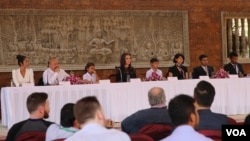A new Hollywood production directed by actress Angelina Jolie about the Khmer Rouge regime premiered in Cambodia this week to critical acclaim.
The Khmer-language film, “First They Killed My Father”, premiered on Saturday at the Terrace of the Elephants inside Cambodia’s famed Angkor Archaeological Park.
It follows the life of a young Cambodian girl growing up under the brutal totalitarian regime under which some 1.7 million Cambodians are thought to have died.
Speaking to reporters on Saturday in Siem Reap, Jolie explained that she wanted the film, which is based on an account from her friend, Cambodian-American author Loung Ung, to portray the lives and struggles of the victims of war as well as the love and care people felt for each other.
“I wanted to tell this story through the eyes of a child and I wanted to walk through this story with a different point of view and I wanted to focus not just on the war, but on the love of the family and the beauty of the country,” she said.
“And in fact, I wanted to understand what my son's birth parents had gone through and I wanted to know him better. And, I wanted to know this country better. And, I hope to honor those who survived and I hope to do honor to my dear friend’s story and her family.”
The film, which had a cast and crew of some 3,500 Cambodians, was produced for Netflix and was filmed in Cambodia last year. Jolie co-produced it with acclaimed Cambodian filmmaker Rithy Panh.
Ung told reporters before the premiere that she was proud of the results.
“I am very very proud of the film and I see it and view it as the story of all of us, that the narrative in there, it is driven [by] the plot for my family, but everybody involved, it becomes part of our story, part of their story,” she said.
“From the make up person, who really worked so hard to make us look so authentic, to the lighting, to the actors, to bong Rithy Panh and his decades of work to get the story out there.”
The film also had premiere screenings in Phnom Penh and Battambang.
Panh said that making a film was much like writing a book or composing a piece of music.
”And, we are very lucky because here, in Cambodia, we use art a lot in the process for healing. You know we're very artistic, in fact. So making a film, singing a song, everything that you could express yourself is good. This story must be told and it belongs to everybody, we need that.”
John Swain, a Briton who reported from Cambodia during the Khmer Rouge period between 1975 and 1979, said he hoped that the film would become part of Cambodia’s “healing process”.
“You know that terrible thing that happened under the Khmer Rouge, there were victims and perpetrators and sometimes they are the same people. And, culturally, it's difficult to talk about this and discuss this and write about this. There have been a few very brave Cambodians who have done that.”
Elizabeth Becker, an author who also reported from Cambodia in the 1970s, said the “brilliantly told story” could help Cambodians come to terms with their dark past.
“[T]hrough arts, the more you tell the story, the more you understand your own country history. This is very important, and it acknowledges what the average Cambodians went through, that is very important, and you cannot tell that story very often, this is just the third major feature film on Cambodian genocide, therefore it is very important. And, I think, it will resonate with all kinds of Cambodians.”
Jonathan Friedland, head of communications for Netflix, said the it was also important for people to see the film internationally “because we live in the world where too often people make decisions in ways which have terrible impact on children and families”.
“And anytime you can remind people of the true human causes of war and bad political decisions is good to do so, because it is horrible for people to suffer like this,” he said.
The Khmer Rouge regime, officially known as Democratic Kampuchea, ruled the country from 1975 to 1979, during which at least 1.7 million Cambodians are believed to have died.
Many died of starvation, torture, overwork, diseases, and killings. Only two surviving Khmer Rouge leaders are currently on trial by the Khmer Rouge tribunal, formally known as the ECCC. The two aging former leaders are Nuon Chea or Brother Number Two, and Khieu Samphan, the head of state of the regime.




